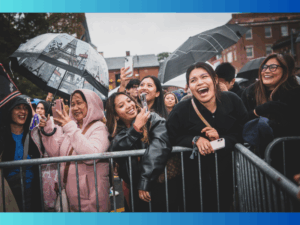Under-trained staff and mixed messaging: Why Massachusetts’ historic psychedelics bill collapsed
On a mild night last fall, two psychedelics advocates joined a meeting of the Democratic Town Committee of Somerville, Massachusetts, to educate voters. They set out to explain the importance of a new state ballot measure, known as Question 4.
If passed, Question 4 would have decriminalized limited possession, use, and home cultivation of mushrooms containing psilocybin and psilocin, as well as plant-derived DMT, ibogaine and mescaline. It would have been the most comprehensive measure of its kind ever proposed in the state of Massachusetts.
Early polling indicated that voters did not favor growing psychedelics at home – just 38% of respondents supported the home grow provision. Nevertheless, members of the Yes On 4 Campaign and the advocates they worked with felt it was time for action. When the Somerville meeting ended, the advocates realized they were in trouble.
“So, tonight, Emily and I attended the Somerville DTC meeting,” wrote the campaign’s Educational Outreach Director Graham Moore in an email, “and it didn’t go great. [We] both winged it.”
“Our team still isn’t really on the same page about how/what to message,” Moore said.
A senior consultant with the New Approach Advocacy Fund working on the campaign, Jared Moffat, saw the thread and agreed, replying, “I want everyone who’s doing presentations to be better trained.” New Approach is a social justice advocacy organization promoting non-punitive drug laws. The organization had raised $7.25 million from donors to support the campaign. With a month to go, the clock was ticking to convince voters to change their minds. What unfolded next reveals hard-earned lessons for the growing wave of psychedelic reform movements currently sweeping across the country.
Currently 16 states are considering legislation to reform laws regulating psychedelics, including in New York, Connecticut, and Massachusetts. As Lucid News reported, a dozen bills have been put forward this year in Massachusetts alone. All this political action requires passionate advocates, campaign staff, and a lot of money. The Yes On 4 campaign had all three, so why did it fail, and what can be learned from that campaign?
After speaking with policy experts and advocates, evidence suggests that despite being well-funded, the Yes on 4 campaign did not effectively educate voters. Lucid News reviewed contracts and internal communications showing the campaign directed its charitable partners to spend on staff and a new affiliate organization, which were uninformed on the issues or had no prior experience with regulatory policies surrounding psychedelics.
Lesson 1: Pay Attention To Polling Data
Before launching the Q4 ballot measure, the Yes on 4 campaign hired prominent polling and opinion organization FM3 Research to see if voters felt access to psychedelics was important.
The right to grow psilocybin mushrooms at home was added to the Q4 ballot initiative after the concept was successfully adopted in a 2022 Colorado measure, but early polling from FM3 Research showed that there was relatively little support for this idea in Massachusetts.
Low polling on a specific issue doesn’t mean it should automatically be removed. “No campaign, especially on drug policy, tends to start out with a 51% approval,” says Jason Ortiz, a longtime campaign organizer who also served as manager of the successful Connecticut cannabis legalization effort in 2021.
“You want to put forward a policy that is going to lay the foundation for the future in a moral and ethical way, not simply pass what is already possible,” said Ortiz. “Part of the motivation of a campaign is to go out there and educate folks and to tell folks why different things are more appropriate … you have to do the work, go out there, and make it happen.”
In an interview with Marijuana Moment in 2023, senior campaign consultant Jared Moffat acknowledged that some voters find it difficult “wrapping their head around” the need for people to grow psychedelics at home. He added that the campaign’s broader objective was to effectively educate voters. “It means that we can go with a more expansive policy, and as long as we do our job in explaining what the ballot initiative is all about and what it does, and we’re clear in our communication,” Moffat said, “then we have a good shot of passing.
Despite the concerns about education, later polls indicated that voters were still not convinced that home grows were a good idea – only 42% of prospective voters indicated “strong support” for Question 4 in an internal poll held last June. Nevertheless, the campaign continued. In September 2024, just weeks before the election, a senior consultant who worked on the campaign said in a podcast interview with The Commonwealth Beacon that a question for voters needs to be “polling [in the] high 60s, low 70s to even have a viable campaign.”
Moffat did not reply to requests for comment about why the campaign moved forward despite low polling on a critical issue.
Lesson 2: First Educate Staffers, Then Educate Voters
On the ground, it appeared that the campaign was not effectively educating Massachusetts voters. At another Massachusetts Democratic Town Committee meeting in Wrentham, close to the Rhode Island border, campaign operatives didn’t mention the home grow provisions included in the proposed bill, and took too long to follow up on questions from voters.
When campaign staffer Tomas O’Brien finally circled back to the town committee leaders a few weeks before the election, offering to provide informational materials, they were rejected.
“We feel very misled by your organization’s presentation.” Wrentham DTC chair Julie Garland replied to O’Brien. “We were led to believe that this ballot question was about providing a well-regulated therapeutic option for folks dealing with treatment-resistant PTSD, anxiety, and depression… Your representative never mentioned that this would permit folks to grow four different types of psychedelics for personal use.”
Even when they did address the home grow question, Yes On 4 campaign staffers didn’t grasp the facts of the argument they were making. At another town committee meeting in Newburyport, Massachusetts, a lobbyist working on the campaign told the audience that the reason why Question 4 included 12×12 feet for home cultivation of psilocybin mushrooms (the equivalent of a mid-sized bedroom) was because “that much space to get enough of the active psychedelic component” was needed. It’s well understood, however, that enough psilocybin mushrooms can be grown for personal use with just a few feet of space in a closet.
Public records show the campaign paid $150,000 for his work.
Lesson 3: Don’t Burn Your Allies
After difficulties educating voters, Moffat called for more credible messengers to endorse Question 4. With three weeks until election day, the campaign organized a press conference for in-state medical experts and clinicians at the Massachusetts State House. They attracted big names like Bessel van der Kolk, the Boston-based psychiatrist and author of The Body Keeps the Score, as well as clinicians working on the front lines like Francis Guerriero, a social worker and therapist in Cambridge who’s been a part of psychedelic activism in Massachusetts for nearly a decade.
Guerriero was invited to appear at the press conference later that same week and to sign a letter of support for Question 4 that had already gained 185 signatories, including notable psychiatrists, researchers, and medical doctors. Guerriero replied in less than a day. Not only would he attend the press event and had already signed the letter, but he also forwarded the letter out to a mailing list of about two hundred other local clinicians interested in psychedelic-assisted therapy.
On the day of the press conference, Guerriero traveled to the capitol on Beacon Hill, but found no cameras, no press, and no one from the campaign waiting for him. After sending an email to Moore, Guerriero learned that the event had been rescheduled.
Guerriero replied with frustration, saying he was the one who linked the team with Bessel van der Kolk “who has lived in Boston forever and did not even know of the campaign. After connecting with more than six people in this campaign and still somehow being out of the loop on this – I must say that I am losing trust in this group’s effectiveness in working with allies and advocates.”
Asked to comment on the internal communications of the campaign (which are no longer covered by active non-disclosure agreements), a spokesperson from the Dewey Square Group, a political consulting firm hired to support the campaign, replied that the company “does not comment on internal client communication or information obtained from confidential client-consultant communications.”
Lesson 4: Spend Campaign Funds Strategically
In April 2024, seven months before election day, three advocates for psychedelic policy reform established a new nonprofit to educate voters on the core issues related to Question 4. Called Open Circle Alliance, or OCA, its mission, according to the organization’s website, is to “promote connection, education, and advocacy to build a supportive psychedelic ecosystem for Massachusetts.”
Around that time, two of OCA’s founders, Stefanie Jones and Rebecca Slater, each signed eight-month contracts valued at $56,000 with the Heroic Hearts Project, a 501(c)(3) nonprofit organization known for its work supporting veterans’ access to psychedelic-assisted therapies. The contracts’ stated purpose was to “support public education related to natural plant medicine.”
During a panel discussion hosted by the Chacruna Institute in March 2025, Jones said she was inspired to start OCA after speaking with Yes on 4 campaign senior consultant Jared Moffat, “And he gave me a call, and he’s like, ‘Hey, we’re doing this thing in Massachusetts. Let me tell you about it.’ And so that was really the motivation for the founding of what became Open Circle Alliance. [Moffat] put me in touch with two other amazing women.”
With more than $110,000 earmarked for their education efforts ahead of the vote, OCA was given more than three times as much money for public education as the campaign’s own educational outreach director. Yet, throughout their seven-month contracts – which expired just after the election – the OCA website indicates that they organized just four events and created an Instagram account that has accrued fewer than 50 followers with only two posts made at the time of this article’s publishing.
In March of 2025, four months after the campaign ended, a group of advocates, including former Q4 campaign staffers Moore and Jamie Morey, sent a firmly worded email to OCA’s leadership about the group’s sizable budget despite their perceived lack of impact. In response, OCA co-founder Jones pointed instead to decisions made by the group that funded the campaign, New Approach.
“While disagreements over funders and approaches to the work are natural sources of conflict and misunderstanding in advocacy, accusations about rate of pay and efficacy are personal attacks,” Jones said. “… They seem to be an extension of the dissatisfaction with how New Approach decided to spend its money, which makes us completely the wrong targets for this critique.”
Moffat, Jones, and Slater all declined to comment on how the New Approach Advocacy Fund chose to spend campaign funds for Question 4.
Lesson 5: Campaign Staffers May Become Whistleblowers
After Question 4 failed to pass by a 14-point margin – with 57 percent voting no against 43 percent voting yes – Morey and Moore filed complaints in June 2025 with the Massachusetts Office of Campaign and Political Finance alleging campaign finance violations. The allegations include improper communications between campaign officials and Open Circle Alliance, using Heroic Hearts Project as a “slush fund” for allegedly unreported in-kind contributions.
In a July 2025 article published in the Boston Globe, Open Circle Alliance refuted claims of potential conflict of interest involving Yes on 4’s Grassroots Campaign Manager Emily Oneschuk’s dual role as Treasurer of OCA.
OCA’s statement to the Globe claimed that Oneschuk stepped away from her work with the organization she helped create in June 2024. But according to multiple eyewitnesses, Oneschuk reportedly spoke about her plans for the organization’s future at the group’s official launch party on June 27, 2024. OCA’s official records filed with the MA Attorney General last month list Oneschuk’s resignation date as July 21, 2025 – just three days after The Boston Globe article was published.
Internal campaign communications obtained by Lucid News also show that Slater and Jones had weekly “MA Psychedelic Outreach” meetings with campaign leadership and staff.
In a statement provided to Lucid News, Slater and Jones deny that their organization was directly affiliated with the Yes on 4 campaign and stand by the work they did at the time. “Open Circle Alliance did not have a ‘strategy for educating voters, ’” the statement added. “Our focus has always been on community-building and education within the psychedelic ecosystem.”
Lesson 6: Manage Funds Wisely To Reach Voters
The backbone of any political campaign is giving voters the information they need to understand the issues and participate in the democratic process. Official statements from the campaign after the election said that the Yes on 4 staff had reached “tens of thousands” of voters across Massachusetts in the run-up to election day. This may be true, but 65% of respondents to an internal exit poll reported “not seeing or not remembering seeing” social media posts, television advertisements, or reading newspaper endorsements for or against the ballot measure.
The same poll showed just 33% of voters supported “allowing people to grow plants containing psychedelics at home” – a loss of 5 points from when they started asking the question to voters nearly eighteen months earlier.
Despite starting out with millions of dollars, the Yes On 4 Campaign missed a big opportunity. Part of the effort to educate voters included a multipronged battle plan that included a comprehensive series of TV advertisements. Totalling over $1 million in contract value, the ad space reserved with local news stations was intended to get the word out during the final weeks leading up to election day, a critical period for gathering votes in any campaign.
Between September and October, however, the Question 4 campaign canceled more than $500,000 of the ads it had reserved. Instead, the campaign chose to repay a $60,000 loan from campaign financier New Approach PAC.
“Generally speaking, you spend a pretty significant chunk of your money in the last two weeks right before an election,” says political organizer Jason Ortiz, “but to pay Open Circle Alliance, over 100 grand and not hold that for an ad buy at the end, is kind of crazy. What [OCA] was hired to do seems very unclear to me. Were they going to just knock on doors and do it by hand? What exactly were they hired to do that could have been a better use of money than buying TV ads?”
In the wake of the infighting, outside experts like Ortiz feel that something about the way the campaign was run doesn’t add up.
“Either they blew the money inappropriately, or they were trying to tank it at the end,” says Ortiz. “ Why didn’t [the campaign] set aside money appropriately if they were hurting for cash that much? Why create Open Circle Alliance?”
Neither New Approach PAC nor Open Circle would comment on the financial decisions made at the end of the campaign.
Lesson 7: Understand The Long-Term Implications
On the other side of the U.S., the fallout from the failure of Question 4 is impacting other campaigns. Natural Medicine Alaska, a grassroots operation with indigenous leadership, is pushing to introduce a ballot initiative similar to Question 4 in that state in 2026. “As we’ve been trying to get support for our initiative nationally,” said Josiah Nash, a member of the Alaska campaign, “some folks have said, ‘Well, look at Massachusetts.’”
During a live interview for Psychedelic State(s) of America’s Advocacy Spotlight Initiative series, Nash said that the home grow provision included in Alaska’s proposed initiative – the same issue that was seemingly toxic to the Massachusetts campaign – is polling consistently with 65% support.
Nash noted that hesitancy over home cultivation among Massachusetts voters has become a common talking point for prospective donors who have turned down the Natural Medicine Alaska team.
“I don’t know the details of necessarily all that happened in Massachusetts,” Nash continued, “but, you know, I’ve heard that there wasn’t that polling about support for home grow.”
In hindsight, those who’ve run state-level campaigns say Question 4 offered clear warning signs that, if heeded by other campaigns, could make all the difference.
When the Question 4 campaign was first coming together, consultants from New Approach Advocacy Fund reached out to several experienced organizers. One of them was Shaleen Title – a lawyer, activist, and Founder of The Parabola Center for Law and Policy – who has worked on drug policy campaigns in Massachusetts and other states. Title was contacted several times but declined to participate, citing concerns that the state of Massachusetts and the campaign itself were not prepared.
“I had major concerns about some local groups working to undermine efforts for regulation, and at the same time, I also had concerns that national funders of previous state-level efforts had not appropriately included local activists,” said Title.
Title adds that she felt that there were additional unanswered questions about commercialization and equity regarding Question 4 – specifically, who was funding the campaign and what kind of return were they expecting to see on their investment. “It seemed like we had a lot of organizing work to do, getting at least a critical mass of activists and supporters on the same page before we would be ready for a major ballot initiative,” said Title. “In hindsight, I think these instincts were correct.”








